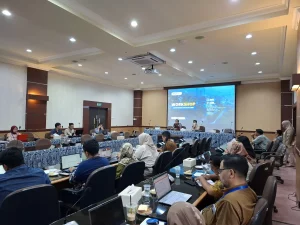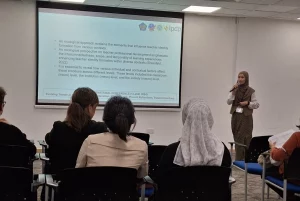The use of smartphones among adolescents has been increasing during the COVID-19 pandemic, especially using the internet daily, because adolescents do not have physical activities during the lockdown. Using the internet for doing assignments from school, using social media as a substitute for meeting with their friends directly, introducing new people and the internet for entertainment such as playing the game online, listening to music or watching a film. This literature aimed to study the risk of internet addiction in adolescents during the COVID-19 pandemic and know parents’ role to accompany adolescents while using the internet daily. This article included article review, systematic review, research journals, qualitative and quantitative methods, and books. Meanwhile, the exclusion journals were not in English. The search of journals accessed from Google Scholar, Pubmed, and Science Direct with keywords ‘adolescents’, ‘internet addiction’, ‘parenting’, ‘education’ and ‘COVID-19’.
Adolescents feel anxious when they are separated from their gadgets. Consequently, they always want to get everything done quickly, up-todate with new information, and get in touch with their friend. They prefer spending more time with gadgets to their families even though they are close together. They rarely have quality time for their family since they are too busy playing with their devices. Thus, gadgets usage among children and teenagers make their parents worry about having less time with their children. The average use of devices in Indonesia for almost two hundred and seventy hours for a month. It is equal to nine hours a day. Two hundred thirty-seven million Indonesian people are internet users. The population detail is 55% of teenagers aged 15-19 years old, 26% aged 20-29 years old, and the least is those aged 30 years and over. There are many risk factors of internet addiction, such as poor parental warmth, poor parental supervision, low parent-child relationship, and elevated interparental conflict.
COVID-2019 overspread across all over countries, and it is causing a pandemic, also pneumonia. The epidemic brought both the death risk of infection and unbearable psychological pressure. The physical distancing and delays in initiating lockdowns across the country are the result of the continuous virus spreading. All face-to-face activities changed into online services during the pandemic, which increased internet use. One of the significant consequences might be an increase in playing the game online, especially in adolescents. Using the internet without control will lead to psychosocial problems and impaired levels of functioning, which have attracted public interest around the world. The addictions are preoccupation and craving, loss of alternative interest, social retreat, tolerance, withdrawal, and loss of control of their attitude. Therefore, the term internet addiction has been proposed to describe the phenomenon of excessive use of specific online-application uncontrolled (e.g., online gaming, pornography, or social networking).
Parental participation in gadgets among adolescents is essential. The parents’ attention is an essential support. They should supervise their children when using the internet. Parents always play a central role in the family, especially in making a big decisions. This kind of circumstance has to take for granted, such as they can ask their children to do the chores. The dividing of household chores to all family members can create a new environment where they can interact with each other instead. If possible, the parents make a rule about setting up a time to use gadgets to not interfere with the interaction between family members at home. Parents give their children information about potential dangers in internet use. They can also share their experience using the internet. The relationship between parents-children builds their bonding. Children obey their parents’ rules in internet use.
The result of this study shows that internet use has been increasing during the COVID-19 pandemic and is at risk of causing addiction to adolescents. Unattended use of the internet and time restrictions from parents are at risk of causing internet addiction in adolescents. Therefore, time restriction and parental supervision are needed for adolescents to use the internet daily.
Author: Dr. Yunias Setiawati, dr.,Sp.K.J(K)
Detailed information from this research can be seen in the author’s writing at:
https://e-journal.unair.ac.id/JBE/article/view/20975/16924
Putri, A.Y., Setiawati, Y., Yi Ting Shieh, Sih-Hsien Lin.(2022). HIGH-RISK INTERNET ADDICTION IN ADOLESCENTS DURING PANDEMIC COVID-19 AND PARENTS’ ROLEJurnal Berkala Epidemiologi Volume 10 No 1. January 2022. 11 – 20. DOI: 10.20473/jbe.v10i12022.11–20








